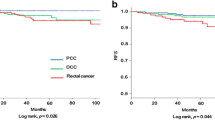Abstract
Background
Different genetic characteristics according to tumor location result in variations in survival rates and treatment responses in advanced colorectal cancer (CRC). However, the effects of tumor location during early CRC are still unclear.
Methods
Patients with T1 CRC treated between 2003 and 2019 were enrolled from a prospectively collected database. Patients were once divided into four groups, then combined into two groups (right- and left-sided CRC) according to the tumor location, and clinical features and oncologic behaviors were compared.
Results
In total, 458 patients were analyzed. Right-sided CRC had a lower incidence of polypoid type tumor than left-sided CRC (36/126 (28.6%) vs 186/332 (56.0%), p < 0.001). There were no differences in tumor size, pathological grade, pT1 substage and lymphovascular invasion between right- and left-sided CRC. Overall, lymph nodal involvement was observed in 42/458 (9.1%) patients. Right-sided CRC had a lower rate of patients with lymph nodal involvement than left-sided CRC (6/126 (4.8%) vs 36/332 (10.8%), p = 0.04).
Conclusion
The present study revealed that there were significant differences in the macroscopic type and the incidence of lymph node involvement between right- and left-sided CRC. The clinical features and oncologic behaviors of T1 CRC are possible to vary according to tumor location.
Similar content being viewed by others
References
Missiaglia E, Jacobs B, D’Ario G et al (2014) Distal and proximal colon cancers differ in terms of molecular, pathological, and clinical features. Ann Oncol 25:1995–2001
Loupakis F, Yang D, Yau L et al (2015) Primary tumor location as a prognostic factor in metastatic colorectal cancer. J Natl Cancer Inst 2015:107
Arnold D, Lueza B, Douillard JY et al (2017) Prognostic and predictive value of primary tumour side in patients with RAS wild-type metastatic colorectal cancer treated with chemotherapy and EGFR directed antibodies in six randomised trials. Ann Oncol 28:1713–1729
Tejpar S, Stintzing S, Ciardiello F et al (2017) Prognostic and predictive relevance of primary tumor location in patients with RAS wild-type metastatic colorectal cancer: retrospective analyses of the CRYSTAL and FIRE-3 Trials. Ann Oncol 28:1713–1729
Dejea CM, Wick EC, Hechenbleikner EM et al (2014) Microbiota organization is a distinct feature of proximal colorectal cancers. Proc Natl Acad Sci USA 111:18321–18326
Shen H, Yang J, Huang Q et al (2015) Different treatment strategies and molecular features between right-sided and left-sided colon cancers. World J Gastroenterol 21:6470–6478
Petrelli F, Tomasello G, Borgonovo K et al (2016) Prognostic survival associated with left-sided vs right-sided colon cancer: a systematic review and meta-analysis. JAMA Oncol 3:211–219
Yahagi M, Okabayashi K, Hasegawa H et al (2016) The worse prognosis of right-sided compared with left-sided colon cancers: a systematic review and meta-analysis. J Gastrointest Surg 20:648–655
Vogelstein B, Fearon ER, Hamilton SR et al (1988) Genetic alterations during colorectal-tumor development. N Engl J Med 319:525–532
Fearon ER, Vogelstein B (1990) A genetic model for colorectal tumorigenesis. Cell 61:759–767
Spratt JS Jr, Ackerman LV (1962) Small primary adenocarcinomas of the colon and rectum. JAMA 179:337–346
Kudo S (1993) Endoscopic mucosal resection of flat and depressed types of early colorectal cancer. Endoscopy 25:455–461
Goto H, Oda Y, Murakami Y et al (2006) Proportion of de novo cancers among colorectal cancers in Japan. Gastroenterology 131:40–46
Jass JR, Whitehall VL, Young J et al (2002) Emerging concepts in colorectal neoplasia. Gastroenterology 123:862–876
Jass JR (2007) Classification of colorectal cancer based on correlation of clinical, morphological and molecular features. Histopathology 50:113–130
Shimoda T, Ikegami M, Fujisaki J et al (1989) Early colorectal carcinoma with special reference to its development de novo. Cancer 64:1138–1146
Ikegami M (1987) A pathological study on colorectal cancer. From de novo carcinoma to advanced carcinoma. Acta Pathol Jpn 37:21–37
Japanese Society for Cancer of the Colon and Rectum (2009) Japanese classification of colorectal carcinoma, 2nd, English edn. Kanehara-& Co., Ltd., Tokyo
Okamoto M, Kawabe T, Yamaji Y et al (2005) Flat-type early colorectal cancer preferentially develops in right-sided colon in older patients. Dis Colon Rectum 48:101–107
Participants in the Paris Workshop (2003) The Paris endoscopic classification of superficial neoplastic lesions: esophagus, stomach, and colon: November 30 to December 1, 2002. Gastrointest Endosc 58:S3–43
Yagi K, Takahashi H, Akagi K et al (2012) Intermediate methylation epigenotype and its correlation to KRAS mutation in conventional colorectal adenoma. Am J Pathol 180:616–625
Yagi K, Akagi K, Hayashi H et al (2010) Three DNA methylation epigenotypes in human colorectal cancer. Clin Cancer Res 16:21–33
Sakai E, Fukuyo M, Ohata K et al (2016) Genetic and epigenetic aberrations occurring in colorectal tumors associated with serrated pathway. Int J Cancer 138:1634–1644
Watanabe T, Itabashi M, Shimada Y et al (2015) Japanese Society for Cancer of the Colon and Rectum (JSCCR) Guidelines 2014 for treatment of colorectal cancer. Int J Clin Oncol 20:207–239
Guo J, Zhu C, Yang K et al (2017) Poly(C)-binding protein 1 mediates drug resistance in colorectal cancer. Oncotarget 8:13312–13319
De Sousa E, Melo F, Wang X et al (2013) Poor-prognosis colon cancer is defined by a molecularly distinct subtype and develops from serrated precursor lesions. Nat Med 19:614–618
Acknowledgements
We thank Dr. Eichi Sasaki and Dr. Yasushi Yatabe (Aichi Cancer Center Hospital, Department of Pathology and Molecular Diagnostics) for pathological diagnosis. We also thank JAM Post Inc. (WA, USA) for proofreading our draft.
Author information
Authors and Affiliations
Corresponding author
Ethics declarations
Conflict of interest
All authors have no potential conflicts of interest, financial or otherwise.
Ethical approval
The present experimental protocols were approved by the institutional review committee at ACCH.
Additional information
Publisher's Note
Springer Nature remains neutral with regard to jurisdictional claims in published maps and institutional affiliations.
About this article
Cite this article
Ouchi, A., Toriyama, K., Kinoshita, T. et al. Variations in clinical features and oncologic behaviors of T1 colorectal cancer according to tumor location. Int J Clin Oncol 25, 1130–1136 (2020). https://doi.org/10.1007/s10147-020-01642-9
Received:
Accepted:
Published:
Issue Date:
DOI: https://doi.org/10.1007/s10147-020-01642-9




